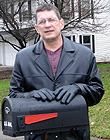David W. Landrum
is professor of Humanities at Cornerstone University, Grand Rapids, Michigan. He has published poetry and short stories in many magazines and journals, including Web Del Sol, The Barefoot Muse, Driftwood Review, Small Brushes, and many others.
He is currently at work on a series of poems about 16th Century English poet Robert Herrick.
—Back to Poetry Contents—
|
Ars Amatoria, Ars Poetica
Catullus knew to count the syllables
in his love poems, as he had counted all
of Lesbia's kisses; Sappho, sensitive
to every sound and pulse within her art
(just like she was with Anactoria)
did the same thing; and Petrarch, when he wrote,
knew Laura's love required exacting rhyme
and meter; Sidney, cloaked as Astrophel,
praised Stella with his sonnets, knowing well
that constant stars require a regular
and steady rhythm; Spenser knew it too
and Amoretti’s lines embody it.
Elizabeth knew Robert would be touched
the most by sonnets (from the Portuguese).
Love’s measure is precisely kept in these.
Leuk
“Cozy, warm, nice, amusing, sheltered”
—from the Nederlands (Dutch) language
Frost frescoed patterns delicate as lace
on the windows of your car, but the car was warm
and as we kissed a troupe of children laughed
and pointed, purple-coated, where we parked.
We drove the slippery causeway, its black ice
barely melting in the glittering sun.
Gravel on an unpaved parking lot
crunched as we hurried, shivering, gasping, numb
into an eatery, the eggs and oil
scenting the air. We drove back to your house—
your kitchen with wooden spoons and pottery
that hinted of the earth, your dog sprawled out
on a braided rug, stream rising, coffee-pot,
the charm of tea, the miracle of bread.
Religiosity
The eunuchry of this religion! It appalls
even the blackest devil ejected from the abyss,
squinting, eyes stabbed with needle-shards of light!
He can’t believe how hell was trumped:
a card smirkingly played (the Ace of Clubs) but then
a Two of Hearts takes it away and wins the game
and he sees what a dive this casino is: the girls,
top-nude, climbing on poles, guys stuffing bills
into their spangled briefs but not allowed to touch.
It’s the “not allowed to touch” he can’t figure out.
Why go to a place like this, a sexy simulacra place,
just to gawk at bouncing boobs and nearly-naked butts?
He likes the chrome bar, shot glasses that blaze with
liquor colored amber and green. Ice cubes elicit wonderment
from him, the lights and smoke (a demon knows smoke well),
the rhythmic limbs, not flailing with torment—or almost not.
He sees the pole-girls smile, but notes the deadness etched
in their upturned mouths, pain in their made-up eyes.
Even Sheol’s lieutenants aren’t immune: he pays
for a lap dance from a girl named Chappell, breasts
covered with red and blue tattoos. She gasps, gyrates,
squeaks, coos. It’s hard for him to keep
his hands down at his sides. When she’s finished
he fumbles for a twenty, stuffs it into her g-string,
feels silky hair and sweat. She slaps his hand,
“If you want that, it’ll cost you a lot more,” she smiles,
then walks off, shaking her posterior. He goes back
to the bar, to its smooth chrome length, orders a drink, observes
the liturgy, offering, the worship here. The women dance,
the men fork up. They have no other place to go.
|

